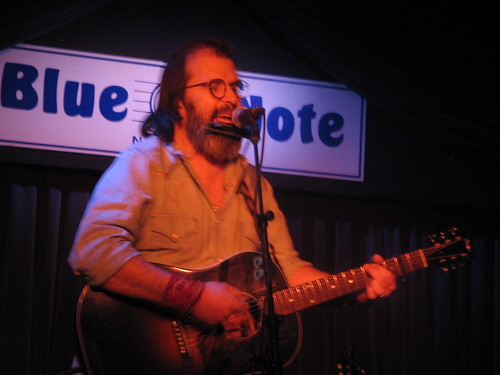.jpg)
Is country music dead? If the cover of the new Dale Watson release “From the Cradle to the Grave” contains any insight the answer is a resounding yes. There Dale stands like a hybrid Pauly Walnuts from the Sopranos and the Unknown Hinson looming sepia soaked in a grave yard. Just behind him on a a headstone is inscribed the verdict – “Country Music R.I.P.” Dale has every reason for writing an obituary, from the Grand ‘ol Oprey’s shafting of older members, big box retailers strangling of music distribution, radio’s rigid top seller play list and the biggest star in country coming from a dismal reality show you’d think death might be the best thing to happen to the genre.
contains any insight the answer is a resounding yes. There Dale stands like a hybrid Pauly Walnuts from the Sopranos and the Unknown Hinson looming sepia soaked in a grave yard. Just behind him on a a headstone is inscribed the verdict – “Country Music R.I.P.” Dale has every reason for writing an obituary, from the Grand ‘ol Oprey’s shafting of older members, big box retailers strangling of music distribution, radio’s rigid top seller play list and the biggest star in country coming from a dismal reality show you’d think death might be the best thing to happen to the genre.
Ten songs in three days. That’s how long it took Watson to write and lay down the tracks in a Hendersonville, TN. cabin formerly owned by Johnny Cash (currently owned by Johnny Knoxville.) Dale has said in interviews says at first he was adamant about not writing or recording anything remotely reminiscent of Johnny Cash but the specter of Cash, technique as well as themes, runs throughout the entire album.
But instead of merely a derivation “From the Cradle to the Grave” sounds like pure Dale Watson. One of the great things
about country music is that the great artists aren’t afraid to wear their influences on their sleeves. Dale displays not
only Cash, but Haggard and Waylon as well.
The Cash DNA boom-chuka-boom runs deeply to excellent affect in the opening “Justice For All,†a song about the between the law and a personal desire for vengeance. The stripped down Tennessee Three sound of Hollywood Hillbilly, a song about Johnny Knoxville, is as no frills as you’re about to find.
The Bananza-like big range sound of “Time Without You” gallops along at a fine pace. “Yellow Mama,” a dark yarn about a life gone wrong and the electric chair waiting at the end. The apocalyptic vibe reflects onward in “Tomorrow Never Comes” with it’s zen like observations of time.
Cash gets a formal call out at the end of “Runaway Train†with lyrics quoted directly from some of the Man In Black’s best known songs. “I hear that train a comin’ / hey Porter, oh Porter / yea I don’t care if I do die do die do die.†closes out the song and this all too short album.
Thanks Dale’s enduring and brave 25-year career and to this album, to paraphrase the late, Great Mark Twain, the rumors of country music’s death has been greatly exaggerated.
 Houston, TX (May 4, 2007) – Texas recording artist Todd Fritsch will support his local library by entertaining attendees of The Round Top Family Library Annual Wrangler’s Gala on June 2 at the Emma Lee Turney Art Center (Round Top, Texas). “Round Top’s population is tiny, just 77 folks live there,” says Texas singer/songwriter and cowboy, Todd Fritsch. “But the Family Library has a huge impact on area residents as it serves all of the surrounding communities, not only with books,movies, on-line access and in-house programs, but also with outreach reading and music programs at local schools.”
Houston, TX (May 4, 2007) – Texas recording artist Todd Fritsch will support his local library by entertaining attendees of The Round Top Family Library Annual Wrangler’s Gala on June 2 at the Emma Lee Turney Art Center (Round Top, Texas). “Round Top’s population is tiny, just 77 folks live there,” says Texas singer/songwriter and cowboy, Todd Fritsch. “But the Family Library has a huge impact on area residents as it serves all of the surrounding communities, not only with books,movies, on-line access and in-house programs, but also with outreach reading and music programs at local schools.”
.jpg)

 About four days ago I was flipping through the Village Voice to see what shows were coming up. I was zipping through the club listings and stopped when I thought I saw a picture of Steve Earle gazing out at me. Sureenough , there it was. Steve Earle at the Blue Note. “Nah, that can’t be” I thought. The legendary Blue Note is better known for it’s improvisational jazz greats like Miles Davis and John Coltrane rather then hillbilly showcases but there it was on the Blue Note website, a two-night four show stint with opener (and 6
About four days ago I was flipping through the Village Voice to see what shows were coming up. I was zipping through the club listings and stopped when I thought I saw a picture of Steve Earle gazing out at me. Sureenough , there it was. Steve Earle at the Blue Note. “Nah, that can’t be” I thought. The legendary Blue Note is better known for it’s improvisational jazz greats like Miles Davis and John Coltrane rather then hillbilly showcases but there it was on the Blue Note website, a two-night four show stint with opener (and 6 Over at
Over at  Pitchfork has a fine
Pitchfork has a fine